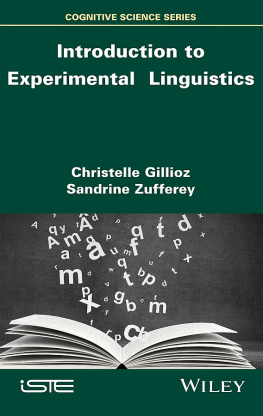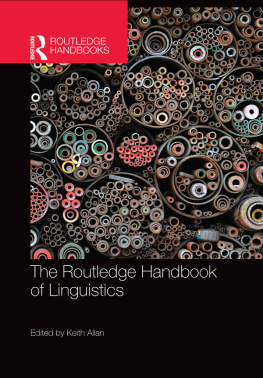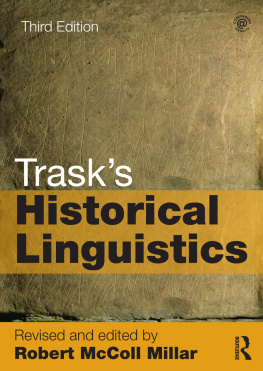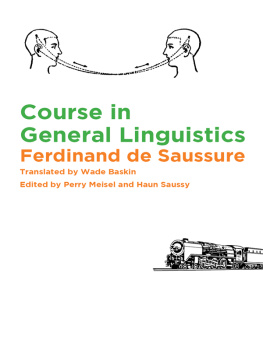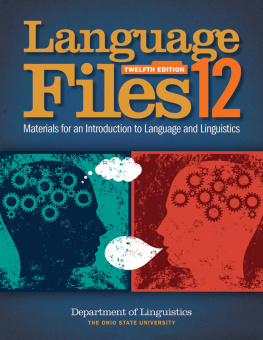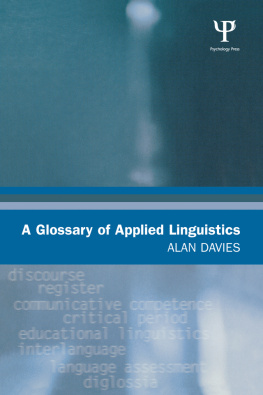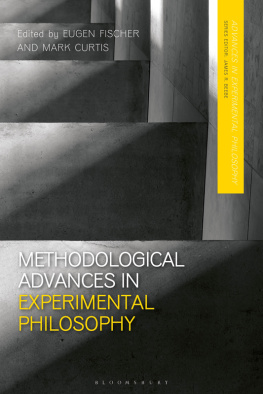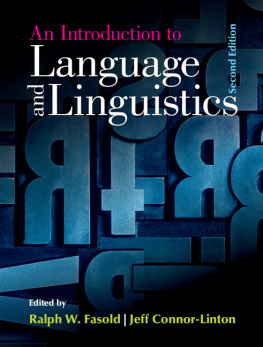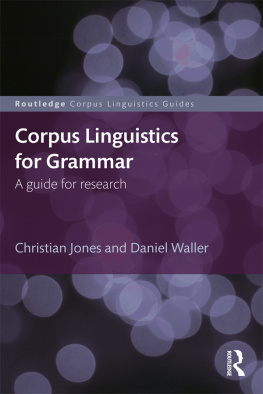First published 2020 in Great Britain and the United States by ISTE Ltd and John Wiley & Sons, Inc.
Apart from any fair dealing for the purposes of research or private study, or criticism or review, as permitted under the Copyright, Designs and Patents Act 1988, this publication may only be reproduced, stored or transmitted, in any form or by any means, with the prior permission in writing of the publishers, or in the case of reprographic reproduction in accordance with the terms and licenses issued by the CLA. Enquiries concerning reproduction outside these terms should be sent to the publishers at the undermentioned address:
John Wiley & Sons, Inc.
The rights of Christelle Gillioz and Sandrine Zufferey to be identified as the authors of this work have been asserted by them in accordance with the Copyright, Designs and Patents Act 1988.
Preface
This book aims to present the theoretical and methodological principles of experimental linguistics in an accessible manner. It intends to offer an overall vision of the field, so as to help the non-initiated audience to become familiar with the necessary concepts for carrying out linguistic experiments. The elements discussed in this book can particularly serve as a basis for a critical understanding of the results published in the scientific literature and as a starting point for carrying out experiments.
Since the field of experimental linguistics is rich and varied, both in terms of the phenomena studied and of the methods employed, it is impossible to offer an exhaustive presentation. The choice of aspects introduced in this book aims to provide an overview of the different possibilities available to those wishing to carry out an experimental study about language. For every aspect developed in the chapters of the book, there exist specific works which, due to their complexity and the prerequisites they demand, are often reserved for an expert audience. This is why we have deliberately chosen to select the information we deem essential for building a knowledge base that will later enable readers to explore the scientific literature and other works on this topic. Therefore, the emphasis will be placed on understanding the scientific approach and the methodological principles underlying the construction of experiments, and on analyzing the data which results from these experiments. In regards to research methods, we chose to make a presentation of the most accessible methods for linguists. In order to illustrate the many possibilities for applying such methods, we have provided examples drawn from different fields in linguistics. Finally, a list of more specific resources and available tools is provided at the end of each chapter, in order to encourage the interested reader to deepen and put into practice the knowledge acquired in this book.
This book begins with an introductory chapter, offering a general overview of the principles underlying experimental methodology, as well as the key concepts which will be developed in the rest of the chapters.
goes through the various points the researcher should comply with in order to conduct a valid and reliable experiment, thus making it possible to infer solid conclusions. First, we will define the concepts of validity and reliability and then discuss the notion of variables, as well as present different options for measuring such variables. We will pay special attention to the stages involved in the transformation of the research question into an experimentally testable hypothesis.
).
presents the main practical aspects associated with the construction of an experiment, such as the various possibilities offered by different types of experimental designs, the criteria for choosing the experimental material, the stages involved in an experiment, the aspects related to data collection, as well as the ethical principles that should be observed while carrying out research with human participants.
Finally, offers an introduction to the analysis of quantitative data, aiming to summarize the key elements for understanding descriptive and inferential statistics, as found in the scientific literature devoted to experimental linguistics. This chapter will also emphasize the peculiarities of the data acquired through linguistic experiments, namely the interdependence of observations. Then, we will introduce mixed linear models that can be used to analyze such types of data.
Christelle GILLIOZ
Sandrine ZUFFEREY
August 2020
Experimental Linguistics: General Principles
We start this chapter by outlining the foundations of the experimental methodology and its main features. Then, we discuss the advantages and disadvantages of this type of methodology, as well as the main arguments in favor of its use in the field of linguistics. Last, we present a series of resources offering access to research in experimental linguistics.
1.1. The scientific process
The experimental methodology in linguistics is part of a scientific approach for studying language. It aims to observe language facts from an objective and quantitative point of view. The general idea behind this approach is that it is impossible to rely on ones own intuitions in order to understand the world. Quite the contrary, it is necessary to observe objective data reflecting reality. For example, by simply observing the world around us, and relying solely on our own intuition, we might believe that the Earth is flat. This is why the scientific approach, used in fields such as psychology or physics, is based on specific principles and stages, instead of relying on the intuition of scientists. Let us briefly go through these stages:
The first stage in the scientific process involves the observation of concrete phenomena and the subsequent generalization of observations, in order to build a scientific fact: a fact which does not depend on a specific place, time, object or person. At this first stage, it is also possible to trace certain regularities concerning the emergence of a phenomenon, and to try to define the conditions in which such phenomenon generally appears. So, let us illustrate this process by reviewing the stages involved in the discovery of gravitation. This finding is usually attributed to Isaac Newton, who is said to have had a revelation after seeing several apples fall from a tree. As he watched the apples fall, Newton wondered why the apples always fell in a perpendicular direction from the apple tree to the ground, never to the side or upwards.
During the second stage, all of the scientific facts concerning the same phenomenon may prompt the development of a law or theory aimed at explaining such facts. A theory synthesizes knowledge about a phenomenon at a given moment and is therefore provisional, insofar as it can evolve according to new knowledge. We should make it clear that the notion of theory in science is rather distant from the meaning of the word

